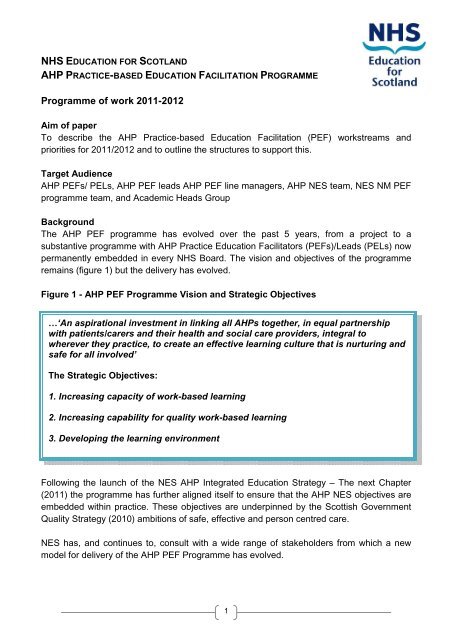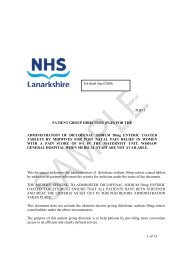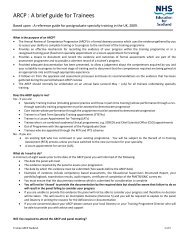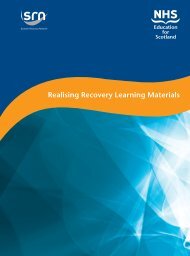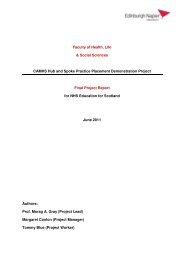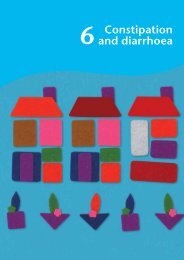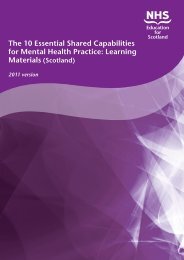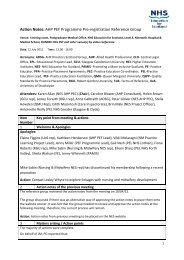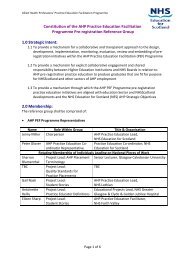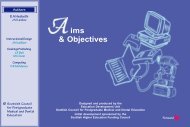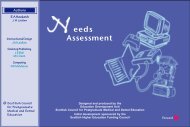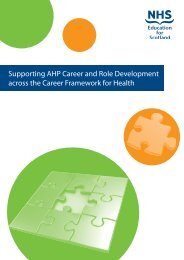AHP PEF Programme work - NHS Education for Scotland
AHP PEF Programme work - NHS Education for Scotland
AHP PEF Programme work - NHS Education for Scotland
You also want an ePaper? Increase the reach of your titles
YUMPU automatically turns print PDFs into web optimized ePapers that Google loves.
<strong>NHS</strong> EDUCATION FOR SCOTLAND<br />
<strong>AHP</strong> PRACTICE-BASED EDUCATION FACILITATION PROGRAMME<br />
<strong>Programme</strong> of <strong>work</strong> 2011-2012<br />
Aim of paper<br />
To describe the <strong>AHP</strong> Practice-based <strong>Education</strong> Facilitation (<strong>PEF</strong>) <strong>work</strong>streams and<br />
priorities <strong>for</strong> 2011/2012 and to outline the structures to support this.<br />
Target Audience<br />
<strong>AHP</strong> <strong>PEF</strong>s/ PELs, <strong>AHP</strong> <strong>PEF</strong> leads <strong>AHP</strong> <strong>PEF</strong> line managers, <strong>AHP</strong> NES team, NES NM <strong>PEF</strong><br />
programme team, and Academic Heads Group<br />
Background<br />
The <strong>AHP</strong> <strong>PEF</strong> programme has evolved over the past 5 years, from a project to a<br />
substantive programme with <strong>AHP</strong> Practice <strong>Education</strong> Facilitators (<strong>PEF</strong>s)/Leads (PELs) now<br />
permanently embedded in every <strong>NHS</strong> Board. The vision and objectives of the programme<br />
remains (figure 1) but the delivery has evolved.<br />
Figure 1 - <strong>AHP</strong> <strong>PEF</strong> <strong>Programme</strong> Vision and Strategic Objectives<br />
…‘An aspirational investment in linking all <strong>AHP</strong>s together, in equal partnership<br />
with patients/carers and their health and social care providers, integral to<br />
wherever they practice, to create an effective learning culture that is nurturing and<br />
safe <strong>for</strong> all involved’<br />
The Strategic Objectives:<br />
1. Increasing capacity of <strong>work</strong>-based learning<br />
2. Increasing capability <strong>for</strong> quality <strong>work</strong>-based learning<br />
3. Developing the learning environment<br />
Following the launch of the NES <strong>AHP</strong> Integrated <strong>Education</strong> Strategy – The next Chapter<br />
(2011) the programme has further aligned itself to ensure that the <strong>AHP</strong> NES objectives are<br />
embedded within practice. These objectives are underpinned by the Scottish Government<br />
Quality Strategy (2010) ambitions of safe, effective and person centred care.<br />
NES has, and continues to, consult with a wide range of stakeholders from which a new<br />
model <strong>for</strong> delivery of the <strong>AHP</strong> <strong>PEF</strong> <strong>Programme</strong> has evolved.<br />
1
In March 2011 the <strong>AHP</strong> <strong>PEF</strong> <strong>Programme</strong> hosted a “conversation” with <strong>AHP</strong> <strong>PEF</strong>s/PELs,<br />
<strong>AHP</strong> <strong>PEF</strong> Leads and <strong>AHP</strong> <strong>PEF</strong> line managers to determine the priorities <strong>for</strong> 2011/12 and<br />
ways of <strong>work</strong>ing and engaging across boards, regions and with other NES <strong>work</strong>streams.<br />
The <strong>AHP</strong> <strong>PEF</strong> programme management group have taken these discussions and<br />
assimilated them with the <strong>AHP</strong> NES Strategy and the <strong>NHS</strong> <strong>Scotland</strong> Quality Strategy<br />
(2010) to <strong>for</strong>m the approach <strong>for</strong> the <strong>AHP</strong> <strong>PEF</strong> <strong>Programme</strong> <strong>for</strong> 2011/12.<br />
<strong>AHP</strong> <strong>PEF</strong> National Strands<br />
The national strands were aspects of the <strong>AHP</strong> <strong>PEF</strong> programme that benefitted from a<br />
national approach. In moving <strong>for</strong>ward with the <strong>AHP</strong> <strong>PEF</strong> programme these strands have<br />
either been encompassed within the one of the four <strong>work</strong>streams, placed within other NES<br />
programmes or put on hold <strong>for</strong> this financial year. The <strong>AHP</strong> <strong>PEF</strong> <strong>Programme</strong> National<br />
Strands Update (Spring 2011) provides the final report on these and will be sent out shortly.<br />
<strong>AHP</strong> <strong>PEF</strong> <strong>Programme</strong> Staff Titles<br />
Following discussion and leading on from the <strong>AHP</strong> <strong>PEF</strong> event in March it is recommended<br />
that the title of the <strong>AHP</strong> Practice <strong>Education</strong> Facilitators be changed. There have already<br />
been changes to this title within a number of boards and the lack of consistency is making<br />
identification confusing. The Chief Executive of NES, Malcolm Wright has confirmed his<br />
commitment to supporting the practice education structures within the boards and the <strong>AHP</strong><br />
<strong>PEF</strong> <strong>Programme</strong> feel it is there<strong>for</strong>e essential that the NES funded <strong>AHP</strong> staff are visible<br />
within the boards. The preferred title appears to be <strong>AHP</strong> Practice <strong>Education</strong> Leads (NES)<br />
and we are requesting that boards utilise this title <strong>for</strong>thwith. Future correspondence and<br />
service level agreements will refer to the <strong>NHS</strong> Board <strong>PEF</strong> programme staff as <strong>AHP</strong> PELs<br />
(NES).<br />
The <strong>AHP</strong> <strong>PEF</strong> priorities <strong>for</strong> 2011 - 2012<br />
The programme activity <strong>for</strong> 2011-2012 will fall under 4 <strong>work</strong>streams from which there will be<br />
core objectives.The 4 <strong>work</strong> streams are:<br />
1. <strong>AHP</strong> <strong>PEF</strong> <strong>Programme</strong> Management and <strong>AHP</strong> Practice <strong>Education</strong> Lead<br />
Development<br />
2. Advancing preregistration <strong>AHP</strong> practice-based education<br />
3. Embed and sustain existing NES educational solutions<br />
4. Supporting <strong>AHP</strong> PELs to nationally share and coordinate local <strong>NHS</strong> Board<br />
Practice-based <strong>Education</strong> Priorities.<br />
The structure of the programme will adapt to support these <strong>work</strong>streams ensuring that there<br />
is robust governance to underpin all the <strong>work</strong> we are doing and also to ensure connectivity<br />
with our stakeholders and other NES <strong>work</strong>streams.<br />
2
Delivering the <strong>work</strong> programme<br />
Appendix 1 provides an overview of the structure that we will adopt to deliver the <strong>work</strong><br />
programme <strong>for</strong> 2011/12. Within NES we have an established <strong>AHP</strong> <strong>PEF</strong> <strong>Programme</strong><br />
Management Group, composed of the three regional practice education co-ordinators, the<br />
programme lead and project management staff. We will utilise this group to oversee the<br />
overall budgetary management, delivery and reporting of the <strong>work</strong> programme <strong>for</strong> 2011-12.<br />
A pre-registration reference group (Appendix 2) has been established which will oversee<br />
and direct <strong>work</strong>stream 2. This model will be explored with the other <strong>work</strong>streams to provide<br />
key stakeholders with the opportunity to engage with the <strong>work</strong> programme in advisory and<br />
governing roles. This will limit the number of reference groups that the programme needs<br />
and will make the most effective use of stakeholder’s time.<br />
Historically the national strands were supported by those boards with less <strong>AHP</strong>s but still<br />
retaining the minimum 0.4 sessions, and <strong>NHS</strong> Highland with additional sessions due to<br />
geography. In 2009 the programme secured additional substantive funding from NES of 1.0<br />
WTE <strong>AHP</strong> <strong>PEF</strong> role. There<strong>for</strong>e, further recurring sessions to deliver on the national strands<br />
were brokered with two boards that had originally been allocated the minimum 0.4 WTE but<br />
had an <strong>AHP</strong> <strong>work</strong><strong>for</strong>ce that had almost warranted additional sessions in the initial WTE<br />
allocation (<strong>NHS</strong> Fife and <strong>NHS</strong> Forth Valley). The remaining 0.6 WTE additional funding was<br />
used through service level agreements with <strong>NHS</strong> Boards to deliver on specific projects<br />
linked to the national strands. This was effective in completing the <strong>work</strong> however used<br />
considerable project administration resources.<br />
This year, in order to support the specific projects within each <strong>work</strong> stream, the additional<br />
0.6 WTE will be allocated on a recurring basis to those boards with no current national role<br />
attached (i.e. <strong>NHS</strong> Glasgow and Clyde, <strong>NHS</strong> Ayrshire and Arran, <strong>NHS</strong> Grampian, <strong>NHS</strong><br />
Lanarkshire, <strong>NHS</strong> Tayside and <strong>NHS</strong> Lothian). This then enables all boards to participate<br />
within the overarching <strong>work</strong> streams in addition to their on-going commitment to implement<br />
the <strong>AHP</strong> <strong>PEF</strong> programme locally.<br />
Each of the <strong>work</strong>streams and their associated projects will develop specific objectives <strong>for</strong><br />
the coming year and beyond as and when appropriate. The <strong>AHP</strong> <strong>PEF</strong> programme will<br />
utilise the evidence base to support implementation and change, specifically recognising<br />
that this requires a sustained input. Utilising the NES <strong>AHP</strong> continuous improvement model<br />
(Figure 2) the <strong>AHP</strong> <strong>PEF</strong> programme will support the development of high quality practicebased<br />
education through:<br />
• scoping what is already there<br />
• sharing educational solutions or <strong>work</strong>ing collaboratively to develop new solutions<br />
• embedding NES resources within practice<br />
• developing exit strategies to ensure that educational solutions are sustained<br />
3
• continually seeking to improve through ongoing evaluation of impact and quality<br />
Figure 2 - NES <strong>AHP</strong> Continuous Improvement Model<br />
We will further develop our communication strategy to ensure that all aspects of the <strong>AHP</strong><br />
<strong>PEF</strong> <strong>Programme</strong> are reported on in a timely and accessible <strong>for</strong>mat.<br />
<strong>AHP</strong> <strong>PEF</strong> <strong>Programme</strong> <strong>work</strong> streams 2011/2012<br />
Workstream 1<br />
<strong>AHP</strong> <strong>PEF</strong> <strong>Programme</strong> Management and <strong>AHP</strong> PEL Development<br />
1.1 Within the NES <strong>AHP</strong> <strong>PEF</strong> programme management group we will <strong>work</strong> to<br />
maintain the <strong>AHP</strong> <strong>PEF</strong> structures across all the 14 territorial health boards.<br />
1.2 We will support and develop the <strong>AHP</strong> Practice <strong>Education</strong> Leads (PELs) through:<br />
• Strengthening our induction programme <strong>for</strong> new PELs<br />
• Providing one-to-one personal development contacts <strong>for</strong> PELs with Practice<br />
<strong>Education</strong> Co-ordinators that will support a learning needs analysis and<br />
identification of appropriate development opportunities <strong>for</strong> these posts.<br />
• Support national development events<br />
• Continue to develop the <strong>AHP</strong> <strong>PEF</strong> <strong>Programme</strong> volumes on the web<br />
• Continuing to support individual PEL educational development e.g. by linking with<br />
the NES career fellowship scheme.<br />
4
• Setting national objectives <strong>for</strong> the programme and supporting PELs to meet these<br />
We propose to <strong>work</strong> with our external stakeholders and the <strong>PEF</strong> net<strong>work</strong> to advance the<br />
quality of pre-registration practice education <strong>for</strong> <strong>AHP</strong>s. Our activities and structures will be<br />
underpinned by the quality strategy and we have established a central pre-registration<br />
reference group to advise and govern our projects in this area.<br />
The specific projects <strong>for</strong> this years <strong>work</strong> are:<br />
2.1 Implementation of the practice placement agreements (PPA)<br />
2.2 Preparation of practice educators<br />
2.3 Implementation of Quality Standards <strong>for</strong> Practice Placements (QSPP)<br />
2.4 Developing common terminology and data collection <strong>for</strong> practice placements<br />
2.5 Developing models of practice placement provision<br />
2.6 Growing the next generation of <strong>AHP</strong>s (Occupational Therapy pilot)<br />
Further in<strong>for</strong>mation on these individual projects will be released shortly.<br />
We will continue to <strong>work</strong> with the NES <strong>AHP</strong> team and Nursing and Midwifery colleagues to<br />
help embed and sustain educational solutions that have been developed within NES. This<br />
will enable PEL roles to support quality <strong>work</strong>-based learning locally.<br />
Project/ Activity<br />
Workstream 2<br />
Advancing Preregistration <strong>AHP</strong> Practice <strong>Education</strong><br />
Workstream 3<br />
Embed and sustain existing NES educational solutions<br />
3.1 Flying Start <strong>NHS</strong> -<br />
3.2 Effective Practitioner – this year’s <strong>work</strong> will involve awareness raising<br />
understanding of the content and purpose of the new programme locally.<br />
3.3 Ryan Harper Legacy experience in wheelchair services<br />
3.4 <strong>AHP</strong> <strong>PEF</strong> volumes on the web<br />
5
To avoid duplication and to provide opportunities <strong>for</strong> support and sharing of educational<br />
solutions the <strong>AHP</strong> <strong>PEF</strong> programme will support the establishment of national groups<br />
focussed on specific shared Health Board priorities. The three projects chosen this year<br />
have been highlighted by a number of Boards and also link into wider NES <strong>AHP</strong> and<br />
NM<strong>AHP</strong> <strong>work</strong>. The project groups <strong>for</strong> these will lead on the development of practice based<br />
education that can then be utilised within other Boards as and when appropriate.<br />
Projects:<br />
4.1 Leadership<br />
4.2 Support <strong>work</strong>ers<br />
4.3 Supervision<br />
Workstream 4<br />
<strong>AHP</strong> <strong>PEF</strong> <strong>NHS</strong> Board Priorities Supporting <strong>AHP</strong> <strong>PEF</strong>s/PELs with the national<br />
sharing and coordination of local <strong>NHS</strong> Board Practice-based <strong>Education</strong> Priorities.<br />
Next steps<br />
In order to take this <strong>work</strong> programme <strong>for</strong>ward a new infrastructure will be utilised. This will<br />
replace the <strong>AHP</strong> <strong>PEF</strong> programme regional groups, bringing together groups of <strong>AHP</strong> PELs<br />
with common interest rather than <strong>for</strong> geographical reasons. However, the <strong>AHP</strong> practice<br />
educator preparation project will involve close collaboration with the HEIs within each of the<br />
regions and there<strong>for</strong>e there will still be opportunities <strong>for</strong> some regional group <strong>work</strong>. All the<br />
<strong>AHP</strong> PEL roles will be supported to net<strong>work</strong> and meet; and the development events will<br />
also enhance this.<br />
The <strong>AHP</strong> Practice <strong>Education</strong> Regional Coordinator role will continue in both a regional<br />
capacity and also to lead on specific aspects of the <strong>work</strong>streams. Their role will support the<br />
connectivity with other regional colleagues and programmes and also to provide in<strong>for</strong>mation<br />
sharing to and from the Health Boards within their regions. They will retain responsibility <strong>for</strong><br />
the <strong>AHP</strong> PELs in the region and ensure that there is support <strong>for</strong> practice education and<br />
leadership <strong>for</strong> personal development needs.<br />
This is an exciting next step <strong>for</strong> the <strong>AHP</strong> <strong>PEF</strong> <strong>Programme</strong> and we are looking <strong>for</strong>ward to<br />
engaging with you over the coming months to move this <strong>for</strong>ward.<br />
6
The NES <strong>AHP</strong> <strong>PEF</strong> <strong>Programme</strong> Team<br />
Jenny Miller – NES <strong>AHP</strong> Practice <strong>Education</strong> <strong>Programme</strong> Lead<br />
Jenny.miller@nes.scot.nhs.uk<br />
Karen Allan – NES <strong>AHP</strong> Practice <strong>Education</strong> Regional Coordinator – North<br />
Karen.allan@nes.scot.nhs.uk<br />
Peter Glover - NES <strong>AHP</strong> Practice <strong>Education</strong> Regional Coordinator - West<br />
Peter.glover@nes.scot.nhs.uk<br />
Bruce McCulloch - NES <strong>AHP</strong> Practice <strong>Education</strong> Regional Coordinator – South-east<br />
Bruce.mcculloch@nes.scot.nhs.uk<br />
Pauline Morrison – Project Officer<br />
Pauline.morrison@nes.scot.nhs.uk<br />
Anne Richardson – Project Administration<br />
Anne.richardson@nes.scot.nhs.uk<br />
References<br />
<strong>NHS</strong> <strong>Education</strong> <strong>for</strong> <strong>Scotland</strong>. 2011, The NES <strong>AHP</strong> <strong>Education</strong> Strategy: The Next Chapter<br />
2011-2014, <strong>NHS</strong> <strong>Education</strong> <strong>for</strong> <strong>Scotland</strong>, Edinburgh.<br />
Scottish Government, 2010, The Healthcare Quality Strategy <strong>for</strong> <strong>NHS</strong><strong>Scotland</strong>. Scottish<br />
Government, Edinburgh,<br />
7
Appendix 1 – <strong>AHP</strong> <strong>PEF</strong> <strong>Programme</strong> Structure
Appendix 2 – The <strong>AHP</strong> <strong>PEF</strong> <strong>Programme</strong> Pre-Registration Reference Group


